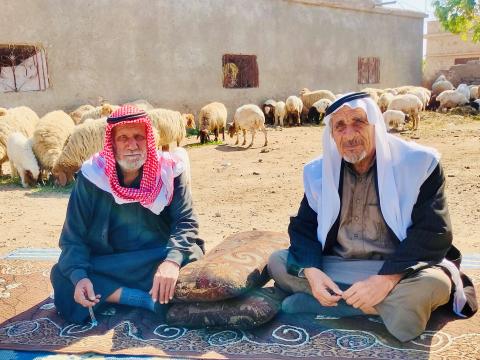Farewell miseries, hello prosperity

Drought, floods, earthquakes; these are high-impact disasters. Unfortunately, the Syrian people have lived through it all, knowing firsthand the fury of Mother Nature and the tragedies she brings. But disasters never stop: climate change and natural disasters, combined with waves of war and displacement, have caused many to lose their source of income, homes and lives.
And just like that 77-year-old Muther’s* story of generations unfolds, each chapter holding challenges they had to face with resilience.
In Syria's countryside, lives Munther's big family of 26 children and 106 grandchildren, who have preserved their roots and heritage for generations, which includes passing on their love of farming and ranching.
But as Munther shares his story, his wrinkles and dwindling eyes reflect the relentless hardships his family has faced due to drought and floods.
A memory from childhood
In Muther’s recollections of his youth, the memory of a devastating drought in the 60s looms large. During those years, his father, desperate to save their flock of sheep, searched the harsh desert repeatedly for life, but his efforts were in vain. “We lost all our livestock and my dad had to work as a shepherd for a meager salary, we were barely surviving”, he recalls.
But disasters weren’t shying away, history repeated itself in the 90s, with extreme drought causing many of the livestock to be sold off or die from starvation, “sometimes I would wish all the sheep would die peacefully together to end their suffering, instead of experiencing starvation and slow death”, he recalls with sadness.
Flourishing before collapsing
2010 was like the dawn of a new day as Muther’s finances were thriving after fruitful seasons. And his livestock reached over 1,700 sheep but that all crashed in no time, in 2011, he lost 400 sheep as they swept away by a flash flood. He shares, "I thought the rain was a sign for the sheep to go out, as there would be abundant pasture for them, not realizing for a moment the danger of dense rain." The impact of the flood extended, threatening his family, “my wife and children woke up screaming as the water reached our tent. And with great difficulty I managed to save them. Although I could not save the sheep, my only concern in those moments was to keep my family safe, I could never forget these terrifying moments”, he continues.
An unexpected visitor
Just as the family was rebuilding their lives again, the shadows of war came running, hunting their livelihoods once again, “we displaced two times in 2014 and 2017 due to escalations in the area, this forced me to sell a great portion of my livestock and by 2020, I only owned 100 sheep. Life is exhausting to say the least”, he shares.
When asked about their general knowledge of the concept of Anticipatory Action, he commented, “an ounce of prevention is better than a pound of cure but unfortunately, no one warns us about natural disasters beforehand or gives us any sort of training. We rely on intuition and experience but even the methods we use are often unstainable and cause us anxiety and loss of livestock. Most farmers have no idea about anticipatory action”.
Our partner, took their time to explain to Munther our Anticipatory Action project, which is a project dedicated to developing a forecast trigger communication system and giving workshops to vulnerable community members on Anticipatory Action Protocol, which were carefully created to cater to Syria and its battle with droughts and floods.
As he listened, a smile formed on his face, expressing his admiration for the project, “This project will have an astronomical impact, as it mitigates the damages caused by natural disasters. My family and the whole community will directly benefit from this system and training conducted. If this project was implemented in the region a long time ago, my family would be living in prosperity now and many breeders would have preserved their livestock and wealth”, says Munther.
Every year, droughts and floods affect the lives of over 110 million people, a number that continues to rise steadily with each passing day.
Through this transformative project, we are reaching numerous vulnerable communities in multiple regions, including Syria, where over 112,000 will be reached, mitigating the impacts of climate change one step at a time.
*Names are changed to protect identity